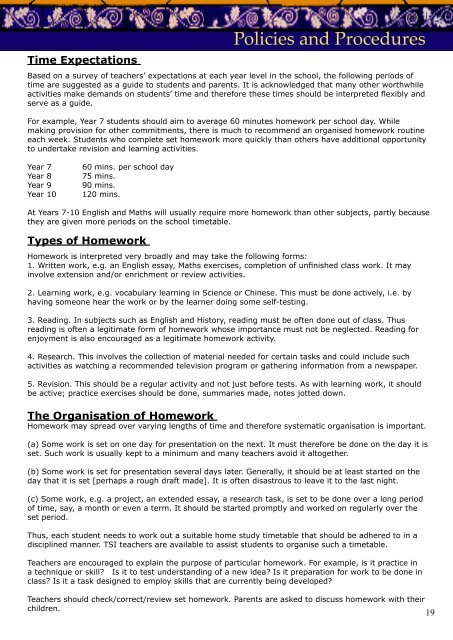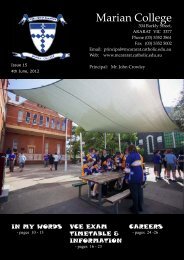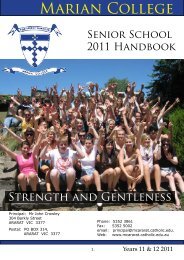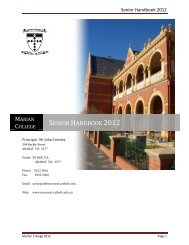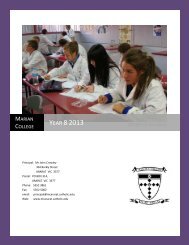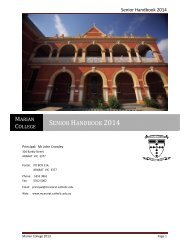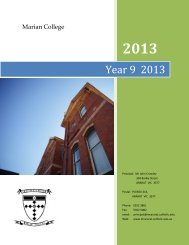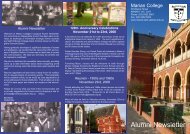download - Marian College
download - Marian College
download - Marian College
You also want an ePaper? Increase the reach of your titles
YUMPU automatically turns print PDFs into web optimized ePapers that Google loves.
Time Expectations<br />
Policies and Procedures<br />
Based on a survey of teachers’ expectations at each year level in the school, the following periods of<br />
time are suggested as a guide to students and parents. It is acknowledged that many other worthwhile<br />
activities make demands on students’ time and therefore these times should be interpreted flexibly and<br />
serve as a guide.<br />
For example, Year 7 students should aim to average 60 minutes homework per school day. While<br />
making provision for other commitments, there is much to recommend an organised homework routine<br />
each week. Students who complete set homework more quickly than others have additional opportunity<br />
to undertake revision and learning activities.<br />
Year 7<br />
Year 8<br />
Year 9<br />
Year 10<br />
60 mins. per school day<br />
75 mins.<br />
90 mins.<br />
120 mins.<br />
At Years 7-10 English and Maths will usually require more homework than other subjects, partly because<br />
they are given more periods on the school timetable.<br />
Types of Homework<br />
Homework is interpreted very broadly and may take the following forms:<br />
1. Written work, e.g. an English essay, Maths exercises, completion of unfinished class work. It may<br />
involve extension and/or enrichment or review activities.<br />
2. Learning work, e.g. vocabulary learning in Science or Chinese. This must be done actively, i.e. by<br />
having someone hear the work or by the learner doing some self-testing.<br />
3. Reading. In subjects such as English and History, reading must be often done out of class. Thus<br />
reading is often a legitimate form of homework whose importance must not be neglected. Reading for<br />
enjoyment is also encouraged as a legitimate homework activity.<br />
4. Research. This involves the collection of material needed for certain tasks and could include such<br />
activities as watching a recommended television program or gathering information from a newspaper.<br />
5. Revision. This should be a regular activity and not just before tests. As with learning work, it should<br />
be active; practice exercises should be done, summaries made, notes jotted down.<br />
The Organisation of Homework<br />
Homework may spread over varying lengths of time and therefore systematic organisation is important.<br />
(a) Some work is set on one day for presentation on the next. It must therefore be done on the day it is<br />
set. Such work is usually kept to a minimum and many teachers avoid it altogether.<br />
(b) Some work is set for presentation several days later. Generally, it should be at least started on the<br />
day that it is set [perhaps a rough draft made]. It is often disastrous to leave it to the last night.<br />
(c) Some work, e.g. a project, an extended essay, a research task, is set to be done over a long period<br />
of time, say, a month or even a term. It should be started promptly and worked on regularly over the<br />
set period.<br />
Thus, each student needs to work out a suitable home study timetable that should be adhered to in a<br />
disciplined manner. TSI teachers are available to assist students to organise such a timetable.<br />
Teachers are encouraged to explain the purpose of particular homework. For example, is it practice in<br />
a technique or skill? Is it to test understanding of a new idea? Is it preparation for work to be done in<br />
class? Is it a task designed to employ skills that are currently being developed?<br />
Teachers should check/correct/review set homework. Parents are asked to discuss homework with their<br />
children.<br />
19


